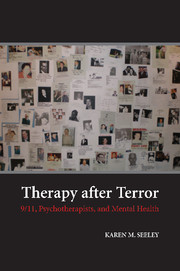Book contents
- Frontmatter
- Contents
- Acknowledgments
- Introduction
- 1 Trauma Histories
- 2 Volunteers for America
- 3 “Get Me Counselors!”
- 4 The Psychological Treatment of Trauma
- 5 The Trauma of Psychological Treatment
- 6 Diagnosing Posttraumatic Stress Disorder
- 7 Trauma as Metaphor
- 8 Mental Health in Traumatic Times
- Notes
- Works Cited
- Index
5 - The Trauma of Psychological Treatment
Published online by Cambridge University Press: 05 August 2012
- Frontmatter
- Contents
- Acknowledgments
- Introduction
- 1 Trauma Histories
- 2 Volunteers for America
- 3 “Get Me Counselors!”
- 4 The Psychological Treatment of Trauma
- 5 The Trauma of Psychological Treatment
- 6 Diagnosing Posttraumatic Stress Disorder
- 7 Trauma as Metaphor
- 8 Mental Health in Traumatic Times
- Notes
- Works Cited
- Index
Summary
As in their routine, pre-9/11 therapeutic encounters, in their clinical work following the attack, mental health professionals focused squarely on their patients, inquiring into what they had experienced and offering them solace and support. Before long, however, the inordinate demands of working with individuals in varying states of fury, shock, and anguish began to unsettle and deplete them. Therapists abruptly were thrown into unimagined professional circumstances in which cases that were technically daunting, and unusually emotionally disturbing, incessantly came their way. When their long workdays with scores of grieving and traumatized patients finally were over, they had nowhere to turn for shelter. Instead, they repaired to a world that seemed scarred beyond recognition. The horrific stories they heard at work were compounded by the terrors that gripped their families, the losses of friends and relatives, and by the sudden shattering of their city's vivacity and its hard-won sense of security. As these circumstances accumulated, many mental health professionals grew progressively unhinged. It soon became painfully clear that the World Trade Center attack had damaged not only the patients who received psychological services but also the therapists who delivered them.
Reeling from multiple blows, many therapists who dedicated themselves to their clinical work in the aftermath of 9/11 did so at their own expense. Several metropolitan area mental health professionals found that the year after the attack was the most agonizing by far of their long professional careers.
- Type
- Chapter
- Information
- Therapy after Terror9/11, Psychotherapists, and Mental Health, pp. 101 - 124Publisher: Cambridge University PressPrint publication year: 2008

